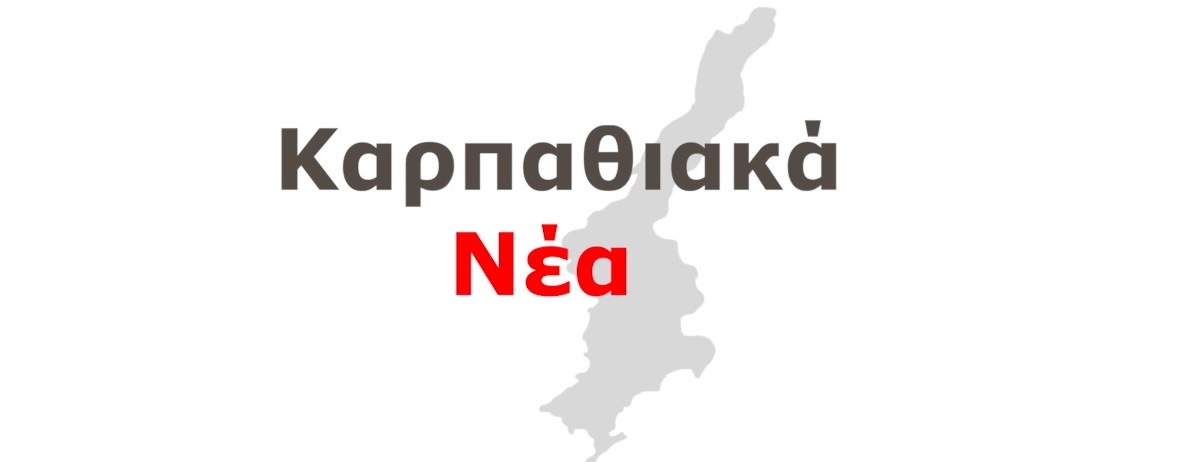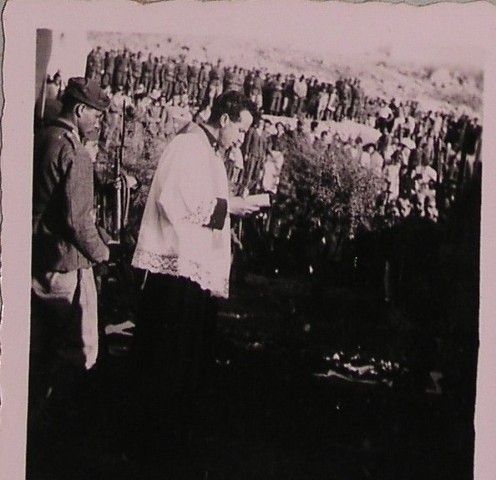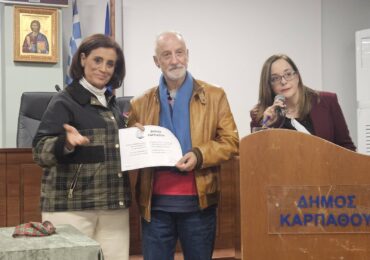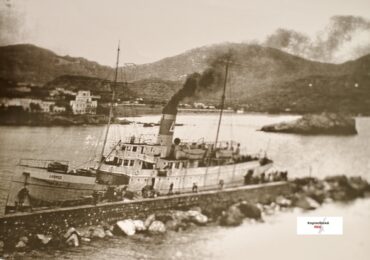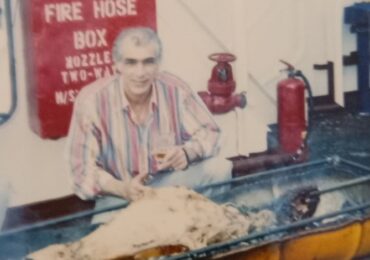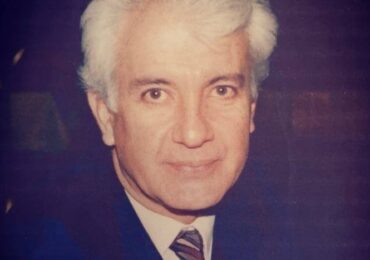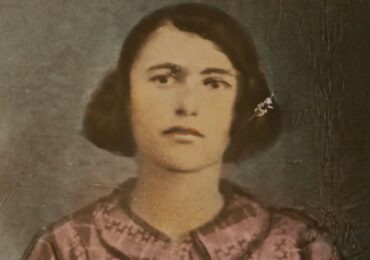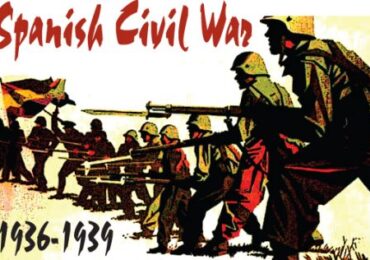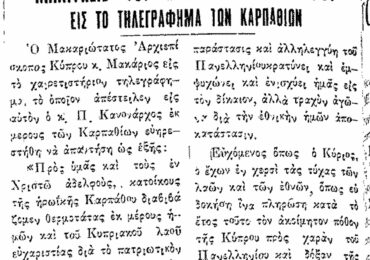Μετά την απόβαση των Γερμανών στην Κάρπαθο στις 6/9/1943 και την παράδοση του νησιού στις 13/9/1943, οι Γερμανοί συγκέντρωσαν σε στρατόπεδα τους Ιταλούς στρατιώτες για να τους στείλουν στην Κρήτη και απ’ εκεί στην Βόρεια Ιταλία, που βρισκόταν υπό τον Μουσολίνι αν ήθελαν να συνεργαστούν μαζί του, ή σε στρατόπεδα αιχμαλώτων στην Γερμανία.
γράφει ο Μανώλης Κασσώτης
Αλλά επειδή τα πλοία που τους μετέφεραν βομβαρδίζονταν από συμμαχικά αεροπλάνα, πολεμικά πλοία και υποβρύχια στο λιμάνι των Πηγαδίων ή στην διαδρομή τους, αρκετοί, που βρήκαν την ευκαιρία και είχαν το θάρρος, δραπέτευσαν και με τη βοήθεια των Καρπαθίων κρύφτηκαν στα χωριά και σε απόμερα εξοχικά σπίτια.
Οι Γερμανοί έβγαλαν διαταγή σύμφωνα με την οποία, όσοι Ιταλοί δραπέτες δεν παραδίνονταν σε τακτή προθεσμία θα εκτελούνταν, και αυτοί που τους βοηθούσαν θα τιμωρούνταν αυστηρά. Όλοι σχεδόν οι δραπέτες παραδόθηκαν πριν περάσει η προθεσμία. Δεν ήταν μόνο η διαταγή των Γερμανών, αλλά το κρύο του χειμώνα που πλησίαζε και το φαγητό που ήταν δύσκολο να βρεθεί.


Είχαμε μετακομίσει στην συνοικία των Λώρων στο Απέρι για περισσότερη ασφάλεια, όπου μερικοί από τους φυγάδες έμεναν την νύχτα σε μικροσπηλιές που υπήρχαν στην λίγο πιο βόρεια πλαγιά του λόφου. Την ημέρα κατέβαιναν και βοηθούσαν στο μάζεμα των ελιών για λίγο φαγητό και για παλιά ρούχα για να μην αναγνωρίζονται από τους Γερμανούς.
Θυμάμαι που ένας απ’ αυτούς είχε «ξεφοβηθεί» και έλεγε ότι αν περνούσε κάποιος Γερμανός στρατιώτης θα πήγαινε να του ζητήσει φωτιά για να ανάψει το τσιγάρο του. Δεν πέρασε πολύ ώρα και ακούστηκαν οι μπότες δυο – τριών Γερμανών που κατέβαιναν το λιθόκτιστο μονοπάτι, που αρχίζει από το εκκλησάκι της Μισοσπορίτισσας και περνούσε δίπλα από το λιόφυτο που δούλευαν οι Ιταλοί. Αμέσως εξαφανίστηκαν όλοι οι Ιταλοί, με πρώτο τον «γενναίο» και κρυφτήκαν στην ρεματιά του ποταμού της Βλύας.
Ο Alessandro Orofino ήταν από τους λίγους Ιταλούς στρατιώτες που δεν παραδόθηκαν. Κρυβόταν στο εκκλησάκι της Κυράς Παναγιάς (σήμερα Αγία Σοφία) στη Βλύα στην συνοικία των Λώρων και μερικές φορές τα βράδια πήγαινε στο σπίτι που έμενε ο υπολοχαγός Ennio Grimaldi με τον υπασπιστή του Rosselli για να του δώσουν λίγο φαγητό. Εκεί κοντά έμενε η Γιωργίτσα Κάτρου, που είχε νερόμυλο, με την μητέρα και τις κόρες της Ζωή και Σοφία, ενώ ο άνδρας και οι γιοί της βρίσκονταν στην Αμερική.


Το πρωί στις 23 Οκτωβρίου η Γιωργίτσα με τις κόρες της πήγαν στο λιόφυτο τους στην Άδεια στα Πηγάδια να μαζέψουν τις ελιές και άφησε τη μάνα της στον νερόμυλο. Σε λίγο έφτασε ο Alessandro και του έφτιαξε φασκόμηλο με λίγο ψωμί, που ήταν δύσκολο να βρεθεί.
Θυμάμαι που σε λίγο παρουσιάστηκε κινητοποίηση στο αυτοκινητόδρομο που πηγαίνει από την Μισοσπορίτισσα στο γεφύρι της Βωλάδας και ο δεκάχρονος αδελφός με άλλους συνομήλικος του πήγαν να δουν τι συμβαίνει. Βρήκαν τον δρόμο κλεισμένο από τους Γερμανούς, το ίδιο είχαν κάμει και από την μεριά της Βωλάδας μπροστά στο εκκλησάκι της Αγίας Παρασκευής, και γύρισαν πίσω.
Συγχρόνως, τρεις Γερμανοί με τον προδότη που τους κατέδωσε το κρησφύγετο του Alessandro, ήρθαν, τον συνέλαβαν και τον οδήγησαν σε ένα χωραφάκι στην κοίτη του ρυακιού που περνά κάτω από το γεφύρι. Του έκαναν τυπική έρευνα και του βρήκαν προκηρύξεις που είχε ρίξει συμμαχικό αεροπλάνο και μεταξύ των άλλων έγραφε ότι οι Σύμμαχοι στις 13 Σεπτεμβρίου απελευθέρωσαν το Καστελόριζο και σύντομα θα ερχόταν και η σειρά των άλλων νησιών.
Οι Γερμανοί έστησαν τον Alessandro μπροστά σε ένα λάκκο μέχρι μισό μέτρο βάθος, που τον είχαν βάλει να σκάψει, και του είπαν να διαβάσει τις προκηρύξεις (γραμμένες στα ελληνικά) και την ίδια στιγμή τον πυροβόλησαν στο κεφάλι. Έπεσε μέσα στο λάκκο και με την βοήθεια του προδότη τον σκέπασαν. Το ίδιο βράδυ ξανάρθε ο προδότης και πήρε τις μπότες που φορούσε ο νεκρός. Μετά από μερικές μέρες, Ιταλοί που δούλευαν για τους Γερμανούς ξέθαψαν το πτώμα του Alessandro και το ξανάθαψαν στο Ιταλικό νεκροταφείο στο Πλατύολο.


Ο Ιταλός στρατιωτικός ιερέας αφηγείται
Μετά από έρευνα του Χάρη Κουτελάκη, εντοπίστηκε το ημερολόγιο στρατιωτικού ιερέα που υπηρετούσε στην Κάρπαθο, στο οποίο γράφει για ίδιο θέμα:
«Στο Όθος έμαθα ότι οι Γερμανοί, το πρωί εκείνου του Σαββάτου 23 (Οκτωβρίου), είχαν διαπράξει ένα φρικτό έγκλημα κατά του στρατιώτη Alessandro Orofino. Την επομένη έμαθα την ιστορία του στρατιώτη. Ζούσε κρυμμένος στην Βωλάδα (πρόκειται για την Βλύα του Απερίου), ένα χωριό 11 χλμ. από τα Πηγάδια, μίλαγε καλά τα ελληνικά, οπότε παρουσιαζόταν σαν Έλληνας. Τον κατέδωσε ένας Έλληνας προδότης. Οι Γερμανοί τον συνέλαβαν, κάπου τον οδήγησαν και τον έβαλαν να διαβάσει μια προπαγανδιστική αφίσα που είχαν ρίξει τα εγγλέζικα αεροπλάνα και ενώ εκείνος διάβαζε, τον πυροβόλησαν στο κεφάλι. Τον έθαψαν σε ένα λάκκο που κάποιοι έλεγαν ότι τον έβαλαν να τον σκάψει μόνος του και από πάνω, έτσι ελέγετο, έβαλαν νάρκες. Τον έγδυσαν, του έβγαλαν το ρολόι, του πήραν το πορτοφόλι και το έδωσαν για αμοιβή στον Έλληνα καταδότη.
Το γεγονός προκάλεσε φρίκη και αγανάκτηση. Την Δευτέρα 25 Οκτωβρίου το βράδυ, θέλησα να πάω να δω που τον είχαν θάψει. αλλά δεν πλησίασα για τον φόβο της νάρκης… Την άλλη μέρα, Τρίτη 26 Οκτωβρίου, πήγα στις Μενετές στον διοικητή λοχαγό Bethege, για να ζητήσω την άδεια να του κάνω μια αξιοπρεπή ταφή. Μου υποσχέθηκε να με ειδοποιήσει την επόμενη μέρα αν πράγματι υπήρχαν νάρκες στο λάκκο της ταφής. Γύρισα στο Όθος πολύ ικανοποιημένος.


Σήμερα το πρωί (29 Οκτωβρίου) πήγα στις Μενετές για να μιλήσω με τον Γερμανό Διοικητή, ο οποίος, πάντα εξυπηρετικός, με άκουσε με την συνήθη ευγένειά του. Από εκείνον έμαθα ότι μπορώ να πάρω το πτώμα του κακόμοιρου στρατιώτη Alessandro Orofino, που τον σκότωσαν στην Βωλάδα και τον έθαψαν κοντά στο γεφύρι. Με διαβεβαίωσε ότι δεν υπάρχουν νάρκες στον τάφο, όπως λανθασμένα ο κόσμος νόμιζε, για τούτο θα πάω το συντομότερο να κάνω αυτήν την πράξη ευσπλαχνίας.
Σήμερα το πρωί, Σάββατο 30 Οκτωβρίου, κατέβηκα στα Πηγάδια μη έχοντας καταφέρει να επιβιβαστώ στο φορτηγό του Giuliani επειδή έφυγε νωρίτερα. Χρειάστηκε να κάνω με τα πόδια την διαδρομή των 13 χιλιομέτρων, που χωρίζει το Όθος από εκείνη την πόλη. Σταμάτησα με τον υπασπιστή μου στην Βωλάδα και επωφελήθηκα από αυτήν την στάση, για να παραγγείλω σ’ ένα ντόπιο μαραγκό ένα φέρετρο για τον στρατιώτη Alessandro Orofino, τον οποίο σκοπεύω να σηκώσω από τον τόπο του εγκλήματος για να τον φέρω στο Στρατιωτικό Κοιμητήριο.
Ήδη είχα συμφωνήσει με την Γερμανική Διοίκηση ότι την επόμενη μέρα, Δευτέρα 1η Νοεμβρίου, θα πήγαινα να σηκώσω κάτω από το γεφύρι της Βωλάδας το πτώμα του στρατιώτη Alessandro Orofino και μου είχαν υποσχεθεί το φορτηγό. Τελικά όταν το είχα αποφασίσει, ο συνταγματάρχης Imbriani επέμεινε λέγοντάς μου ότι δεν μπορούσε να μου δώσει το αυτοκίνητο και έτσι έμεινα στα Πηγάδια και για εκείνο το βράδυ.
Στις έξι το πρωί, αφού πήρα το αυτοκίνητο του συνταγματάρχη Imbriani, φεύγω για το Όθος. Πρέπει να φθάσω νωρίς, επειδή το γερμανικό φορτηγό θα είναι στην Βωλάδα στις επτά και μισή και εγώ δεν ξέρω ακόμα αν ο μαραγκός έφτιαξε το φέρετρο και εάν στο Νοσοκομείο μας είναι έτοιμη η ομάδα με όλα τα εργαλεία, για να προβούν στην θλιβερή πράξη της εκταφής του πτώματος.
Στις πρώτες ανηφόρες για να ανεβεί στο Απέρι το δικό μου αυτοκίνητο αρχίζει να ξεφυσάει και η μηχανή ξαφνικά σταματάει. Μετά από λίγο ξαναπαίρνει μπρος, το πρόβλημα συνεχίζεται και το αυτοκίνητο σταματάει ξανά. Ο οδηγός μου εξηγεί ότι ο σωλήνας της βενζίνης είναι βουλωμένος, αλλά σιγά-σιγά και σπασμωδικά φτάνουμε στο Απέρι.
Στέλνω τον υπασπιστή μου με τα πόδια στον μαραγκό, ενώ ο οδηγός προσπαθεί να επιδιορθώσει το πρόβλημα του αυτοκινήτου. Επιτέλους ξεκινάμε και πάνω από το χωριό ξαναβρίσκω τον υπασπιστή που με πληροφορεί ότι ο μαραγκός δεν έχει κάνει τίποτα γιατί δεν ήταν σίγουρος για την παραγγελία, αλλά άρχισε αμέσως την κατασκευή του φέρετρου και ελπίζει να μου το φέρει σε δυο ώρες! Σε δυο ώρες θα έπρεπε να είμαστε στο Στρατιωτικό Νεκροταφείο. Δεν μπορώ να απαιτήσω το γερμανικό φορτηγό να είναι στην διάθεσή μου ολόκληρη την μέρα! Θα δούμε τι να κάνουμε στην επιστροφή.
Φθάνουμε στο Όθος και τα βρίσκω όλα προετοιμασμένα: Έξι άνδρες με φτυάρια, γάζες, αντισηπτικά και λαστιχένια γάντια. Πρέπει να ξεθάψουμε ένα πτώμα που έχει ταφεί πριν δέκα μέρες, με ό,τι αυτό συνεπάγεται. Το αυτοκίνητο με το οποίο είχα έρθει είχε ξαναφύγει αμέσως και διασταυρώνεται στην Βωλάδα με το γερμανικό φορτηγό. Ο αξιωματούχος που ήταν επάνω ήταν τόσο ευγενής ώστε να έρθει στο Όθος να μας πάρει όλους. Γυρίσαμε στο τόπο όπου έπρεπε να επιτελέσουμε το έργο μας. Μόλις φτάσαμε, έστειλα κάτω τρεις για να επιταχύνουν την κατασκευή του φέρετρου (τέσσερις σανίδες καρφωμένες) ενώ οι άλλοι ήταν έτοιμοι να αρχίσουν την δουλειά.
Πριν αρχίσουν, όμως, θέλησα να βεβαιωθώ για την παρουσία ή όχι ναρκών, κυλώντας ογκόλιθους και σε κάθε περίπτωση έδωσα εντολή να λάβουν κάθε δυνατή προφύλαξη. Δεν ήθελα κάποιος να χάσει τη ζωή του για να ξεθάψει ένα νεκρό! Όμως όλα πήγαν τέλεια και ο πολύς χρόνος που χρειάστηκε για να αφαιρεθούν οι πέτρες και τα χώματα (περίπου δυο ώρες) χρησίμευσε για να δώσει στον μαραγκό την δυνατότητα να ετοιμάσει το φέρετρο. Ευλόγησα πολλές φορές το πτώμα και τέλος πριν το κλείσουμε, απάγγειλα τις τελετουργικές ευχές της κηδείας.
Η όψη του πτώματος ήταν καλή, γενικά μόνον το πρόσωπο ήταν κατεστραμμένο και ένα χέρι είχε τοποθετηθεί πίσω στο σβέρκο για να μην φαίνεται η πληγή. Ήταν ντυμένος με χακί παντελόνι και σακάκι γκρι πρασινωπό και ο στρατιωτικός σάκος βρέθηκε εκεί κοντά. Δεν βρέθηκε κανένα ντοκουμέντο, επειδή το πορτοφόλι που περιείχε 8 ή 9 χιλιάδες λιρέτες δόθηκε στον Έλληνα προδότη Μανώλη Π…, ως βραβείο για την προδοσία του. Είθε ο Κύριος να τον πληρώσει με ό,τι του αξίζει!
Η ομάδα γύρισε στο Όθος και εμείς συνεχίσαμε για το Κοιμητήριο. Κατά την διαδρομή απάγγειλα ψαλμούς και προσευχές για τον νεκρό. Στην Δαματρία πήρα μαζί μου έξι στρατιώτες μας οι οποίοι πραγματοποίησαν το έργο της ταφής. Πριν κατεβάσουν τον νεκρό, του έδωσα, ακόμα μια φορά, άφεση και ευλόγησα τον τάφο. Γυρίσαμε στα Πηγάδια στις 11. Αφού πήγα στην Γερμανική Διοίκηση για να ευχαριστήσω τον Διοικητή που τόσο ευγενικά μου διέθεσε το φορτηγό, ζήτησα από τον Συνταγματάρχη (Imbriani) το αυτοκίνητο για να γυρίσω στον Όθος, που μου παραχωρήθηκε αμέσως».
Όταν έγινε γνωστή η εκτέλεση του Alessandro έπαψε να παίζει το βιολί του Ennio Grimaldi και το ακορντεόν του Rosselli ερωτικά και νοσταλγικά ναπολιτάνικα τραγούδια και μελωδίες, και όταν μετά από μέρες ξανακούστηκαν, έμοιαζαν με το κλάμα και τα αναφιλητά της μάνας του Alessandro.
The tragic end of Italian soldier Alessandro Orofino, on Karpathos in WWII
By Manolis Cassotis
After the German landing on Karpathos on September 6, 1943, and the surrender of the island on the 13th, the Germans gathered the Italian soldiers into camps to send them to Crete and from there to Northern Italy, which was under Mussolini if they wanted to collaborate with him, or to prisoner of war camps in Germany.
But because the ships carrying them were bombed by Allied planes, warships and submarines in the port of Pigadia or on their way, several, who found the opportunity and had the courage, escaped and, with the help of the Karpathians, hid in the villages and in remote country houses.
The Germans issued an order that any Italian deserters who did not surrender within the stipulated time would be executed, and those who helped them would be severely punished. Almost all the deserters surrendered before the deadline. It was not only the German order, but the cold of winter that was approaching, and food that was hard to find.
We had moved to Lori neighborhood in Aperi for more safety, where some of the escapees stayed at night in small caves on the slightly northern slope of the hill. During the day they would come down and help pick olives for a little food and for old clothes so that they would not be recognized by the Germans.
I remember that one of them who said that he was not “scared” and said that if a German soldier passed by, he would go and ask him for light to light his cigarette. It didn’t take long and soon the boots of two or three Germans were heard coming down the stone-built path that starts from the church of Missosporitissa and passes by the olive grove where the Italians were working. Immediately all the Italians disappeared, starting with the “brave one”, and hid in the ravine of the Vlya River.
Alessandro Orofino was one of the few Italian soldiers who did not surrender. He hid in the chapel of Kyra Panagia (today Saint Sofia) in Vlya in the Loros district, and sometimes in the evenings he would go to the house where Lieutenant Ennio Grimaldi lived with his aide Rosselli to give him some food. Nearby lived Giorgitsa Katrou, who owned a watermill, with her mother and daughters Zoe and Sofia, her husband and sons were in America.
On the morning of October 23, Giorgitsa and her daughters went to their olive grove in Adia in Pigadia to pick olives and left her mother at the watermill. Alessandro arrived shortly after and made him mountain tea with some bread that was hard to find.
I remember that shortly after, there was a mobilization on the road that goes from Misosporitissa to the Volada bridge, and my ten-year-old brother and other children his age went to see what was happening. They found the road blocked by the Germans, they had done the same on the Volada side in front of the little church of Saint Paraskevi, and they turned back.
At the same time, three Germans, with the traitor who had given them Alessandro’s hideout, came, arrested him and took him to a small field on the small field next to the stream that passes under the bridge. They carried out a formal search and found leaflets on him that had been dropped by an Allied plane, among other things it said that the Allies, on September 13, liberated Kastelorizo and that the other islands would soon follow.
The Germans stood Alessandro in front of a pit up to half a meter deep, which they had made him dig, and told him to read the leaflets (written in Greek) and at the same time they shot him in the head. He fell into the pit and with the help of the traitor they covered him, the same night the traitor came and took the boots from the dead man. After a few days, Italians working for the Germans dug up Alessandro’s body and reburied it in the Italian cemetery in Platiolo.
The Italian military chaplain narrates
After research by Haris Koutelakis, the diary of a military chaplain who served in Karpathos was located, in which he writes on the same subject:
“In Othos I learned that the Germans, on the morning of that Saturday 23 (October), had committed a horrible crime against the soldier Alessandro Orofino. The next day I learned the soldier’s story. He was living in hiding in Volada (it was Vlya of Aperi), a village 11 km from Pigadia, he spoke Greek well, so he presented himself as a Greek. He was betrayed by a Greek traitor. The Germans arrested him, took him somewhere and made him read a propaganda poster that had been dropped by British planes and while he was reading, they shot him in the head. They buried him in a pit that some said, that made him dig himself and on top, so it was said, they laid mines. They stripped him, took off his watch, took his wallet and gave it to the Greek informer as a reward.
The event caused horror and indignation. On Monday, October 25th, in the evening, I wanted to go and see where he had been buried. but I did not go near for fear of mines… The next day, Tuesday, October 26th, I went to Menetes to see the commander, Captain Bethege, to ask for permission to give him a decent burial. He promised to notify me the next day if there were indeed mines in the burial pit. I returned to Othos very satisfied.
This morning (October 29) I went to Menetes to speak with the German Commander, who, always helpful, listened to me with his usual courtesy. From him I learned that I could take the body of the unfortunate soldier Alessandro Orofino, who was killed at Volada and buried near the bridge. He assured me that there were no mines in the grave, as people mistakenly thought, so I will go as soon as possible to perform this act of mercy.
This morning, Saturday, October 30, I went down to Pigadia, having not been able to board Giuliani’s truck because he left earlier. I had to walk the 13 kilometers that separates Othos from that city. I stopped, with my assistant, in Volada and took advantage of this stop to order a coffin from a local carpenter for the soldier Alessandro Orofino, whom I intend to lift from the scene of the crime to bring to the Military Cemetery.
I had already agreed with the German Command that the next day, Monday, November 1, I would go to lift the body of soldier Alessandro Orofino from under the Volada bridge, and they had promised me the truck. Finally, when I had decided, Colonel Imbriani insisted, telling me that he could not give me the car, and so I stayed in Pigadia for that night as well.
At six in the morning, after taking Colonel Imbriani’s car, I leave for Othos. I must arrive early, because the German truck will be in Volada at seven thirty and I don’t yet know if the carpenter has made the coffin and if the team with all the tools is ready at our hospital to carry out the sad act of exhuming the body.
On the first few hills to get to Aperi, my car starts to sputter, and the engine suddenly stops. After a while it starts again, the problem continues and the car stops again. The driver explains to me that the gas pipe is clogged, but slowly and jerkily we reach Aperi.
I send my assistant on foot to the carpenter, while the driver tries to fix the car. Finally, we start and above the village I find the assistant again who informs me that the carpenter has not done anything because he was not sure about the order, but he immediately started making the coffin and hopes to bring it to me in two hours! In two hours, we should be at the Military Cemetery. I cannot demand that the German truck be at my disposal all day! We will see what to do on the way back.
We arrive at Othos, and I find everything prepared: Six men with shovels, gauze, antiseptics and rubber gloves. We must exhume a body that has been buried for ten days, with all that entails. The car I had come in had immediately left again and intersects with the German truck at Volada. The official who was up there was kind enough to come to Othos to pick us all up. We returned to the place where we had to carry out our work. As soon as we arrived, I sent three down to speed up the construction of the coffin (four boards nailed together) while the others were ready to start work.
Before they started, however, I wanted to make sure of the presence or not of mines, rolling boulders and in any case, I gave the order to take every possible precaution. I did not want anyone to lose their life to dig up a dead body! But everything went perfectly and the long time it took to remove the stones and soil (about two hours) served to give the carpenter the opportunity to prepare the coffin. I blessed the body many times and finally, before closing it, I recited the funeral ritual wishes.
The appearance of the body was good, generally only the face was damaged, one hand had been placed behind the back of the neck so that the wound would not be visible. He was dressed in khaki trousers and a greenish-gray jacket, the military bag was found nearby. No documents were found, because the wallet containing 8 or 9 thousand lire was given to the Greek traitor Manolis P…, as a reward for his betrayal. May the Lord pay him with what he deserves!
The team returned to Othos, and we continued to the Cemetery. Along the way I recited psalms and prayers for the deceased. In Damatria I took six of our soldiers with me who carried out the work of burial. Before they took the deceased down, I gave him, once again, absolution and blessed the grave. We returned to Pigadia at 11. After that I went to the German Command to thank the Commander who so kindly provided me with the truck. I asked the Colonel (Imbriani) for the car to return to Othos which was immediately granted to me.
When Alessandro’s execution became known, Ennio Grimaldi’s violin and Rosselli’s accordion stopped playing romantic and nostalgic Neapolitan songs and melodies, and when they were heard again days later, they resembled the crying and sobbing of Alessandro’s mother.
www.anamniseis.net
19.11.2025
Καρπαθιακά Νέα
